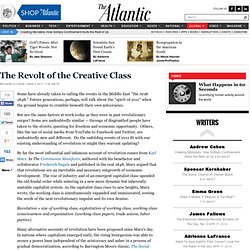

The end of the Arab dream - By James Traub. If Muammar al-Qaddafi falls, as seems increasingly likely, he will land with the rending crash of an immense, rigid object, like the statue of Saddam Hussein pulled down in Baghdad's Firdos Square.

This is not because, despite his own delusions, Qaddafi mattered to the world remotely as much as Saddam did. Rather, it's because the Jamahiriya, or stateless society, he fostered in Libya constitutes the last of the revolutionary fantasies with which Arab leaders have mesmerized their citizens and justified their ruthless acts of repression since the establishment of the modern Arab world in the years after World War II. Qaddafi and the other junior officers who overthrew Libya's King Idris in a bloodless coup in 1969 were inspired by the revolt of the Free Officers in Egypt, who had similarly deposed an unpopular, pro-Western monarch in 1952.
Read more. YouTube. Revolt of the Creative Class. Some have already taken to calling the events in the Middle East "the Arab 1848.

" Future generations, perhaps, will talk about the "spirit of 2011" when the ground begins to crumble beneath their own autocracies. But are the same factors at work today as they were in past revolutionary surges? Some are undoubtedly similar -- throngs of disgruntled people have taken to the streets, questing for freedom and economic opportunity. Others, like the use of social media from YouTube to Facebook and Twitter, are undoubtedly new and different. Do the unfolding events of 2011 fit with our existing understanding of revolution or might they warrant updating? By far the most influential and infamous account of revolution comes from Karl Marx. Revolution = size of working class, exploitation of working class, working class consciousness and organization (working class papers, trade unions, labor parties).
Many alternative accounts of revolution have been proposed since Marx's day. World’s 50 richest Arabs. The world’s 50 richest Arabs are worth a total of just over $245bn, an 18 percent increase on the same figure just over a year ago, the Arabian Business Rich List 2010 reveals.

Top of the list is Kingdom Holding chairman Prince Alwaleed, who has $20.4bn – a figure that has been verified by his private office. Saudi Arabia’s Mohamed Bin Issa Al Jaber retains second place on the list after increasing his wealth from $9.7bn to $12bn over the course of the last year. The Olayan family has jumped five places to claim the third spot, with $11.9bn, pipping Mohammad Al Amoudi in fourth.
Last year’s third-richest person, Nasser Al Kharafi, drops to sixth place. Altogether, the wealth of the top 10 people on our list amounts to just shy of $100bn. This year’s highest new entry was the Bugshan family, which claimed eighth place, while the biggest riser was the Bukhamseen family which jumped from 47th to 25th. To read the full Arabian Business Rich List 2010, click here.